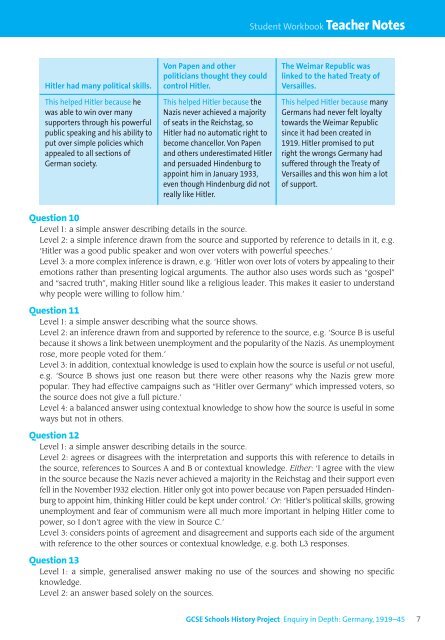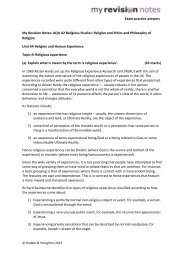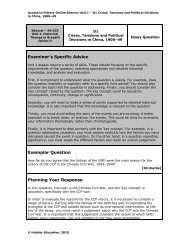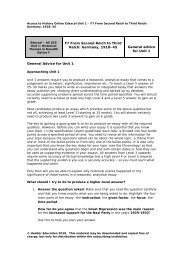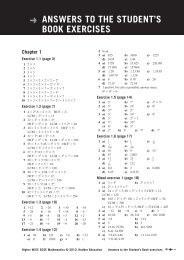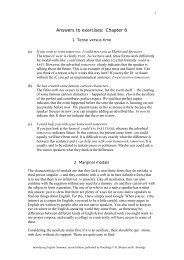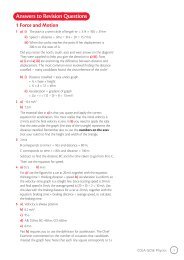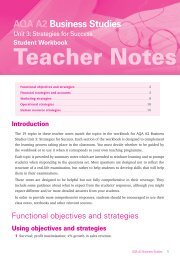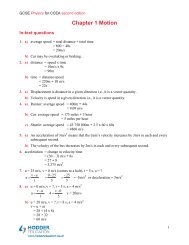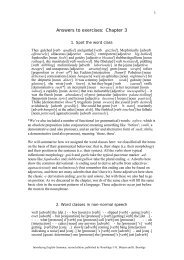GCSE Schools History Project Enquiry in Depth - Hodder Plus Home
GCSE Schools History Project Enquiry in Depth - Hodder Plus Home
GCSE Schools History Project Enquiry in Depth - Hodder Plus Home
You also want an ePaper? Increase the reach of your titles
YUMPU automatically turns print PDFs into web optimized ePapers that Google loves.
Student Workbook Teacher NotesHitler had many political skills.This helped Hitler because hewas able to w<strong>in</strong> over manysupporters through his powerfulpublic speak<strong>in</strong>g and his ability toput over simple policies whichappealed to all sections ofGerman society.Von Papen and otherpoliticians thought they couldcontrol Hitler.This helped Hitler because theNazis never achieved a majorityof seats <strong>in</strong> the Reichstag, soHitler had no automatic right tobecome chancellor. Von Papenand others underestimated Hitlerand persuaded H<strong>in</strong>denburg toappo<strong>in</strong>t him <strong>in</strong> January 1933,even though H<strong>in</strong>denburg did notreally like Hitler.The Weimar Republic wasl<strong>in</strong>ked to the hated Treaty ofVersailles.This helped Hitler because manyGermans had never felt loyaltytowards the Weimar Republics<strong>in</strong>ce it had been created <strong>in</strong>1919. Hitler promised to putright the wrongs Germany hadsuffered through the Treaty ofVersailles and this won him a lotof support.Question 10Level 1: a simple answer describ<strong>in</strong>g details <strong>in</strong> the source.Level 2: a simple <strong>in</strong>ference drawn from the source and supported by reference to details <strong>in</strong> it, e.g.‘Hitler was a good public speaker and won over voters with powerful speeches.’Level 3: a more complex <strong>in</strong>ference is drawn, e.g. ‘Hitler won over lots of voters by appeal<strong>in</strong>g to theiremotions rather than present<strong>in</strong>g logical arguments. The author also uses words such as “gospel”and “sacred truth”, mak<strong>in</strong>g Hitler sound like a religious leader. This makes it easier to understandwhy people were will<strong>in</strong>g to follow him.’Question 11Level 1: a simple answer describ<strong>in</strong>g what the source shows.Level 2: an <strong>in</strong>ference drawn from and supported by reference to the source, e.g. ‘Source B is usefulbecause it shows a l<strong>in</strong>k between unemployment and the popularity of the Nazis. As unemploymentrose, more people voted for them.’Level 3: <strong>in</strong> addition, contextual knowledge is used to expla<strong>in</strong> how the source is useful or not useful,e.g. ‘Source B shows just one reason but there were other reasons why the Nazis grew morepopular. They had effective campaigns such as “Hitler over Germany” which impressed voters, sothe source does not give a full picture.’Level 4: a balanced answer us<strong>in</strong>g contextual knowledge to show how the source is useful <strong>in</strong> someways but not <strong>in</strong> others.Question 12Level 1: a simple answer describ<strong>in</strong>g details <strong>in</strong> the source.Level 2: agrees or disagrees with the <strong>in</strong>terpretation and supports this with reference to details <strong>in</strong>the source, references to Sources A and B or contextual knowledge. Either: ‘I agree with the view<strong>in</strong> the source because the Nazis never achieved a majority <strong>in</strong> the Reichstag and their support evenfell <strong>in</strong> the November 1932 election. Hitler only got <strong>in</strong>to power because von Papen persuaded H<strong>in</strong>denburgto appo<strong>in</strong>t him, th<strong>in</strong>k<strong>in</strong>g Hitler could be kept under control.’ Or: ‘Hitler’s political skills, grow<strong>in</strong>gunemployment and fear of communism were all much more important <strong>in</strong> help<strong>in</strong>g Hitler come topower, so I don’t agree with the view <strong>in</strong> Source C.’Level 3: considers po<strong>in</strong>ts of agreement and disagreement and supports each side of the argumentwith reference to the other sources or contextual knowledge, e.g. both L3 responses.Question 13Level 1: a simple, generalised answer mak<strong>in</strong>g no use of the sources and show<strong>in</strong>g no specificknowledge.Level 2: an answer based solely on the sources.<strong>GCSE</strong> <strong>Schools</strong> <strong>History</strong> <strong>Project</strong> <strong>Enquiry</strong> <strong>in</strong> <strong>Depth</strong>: Germany, 1919–457


